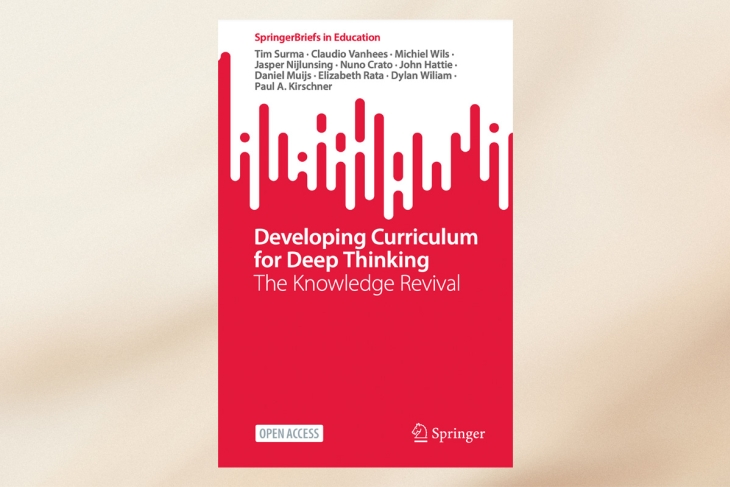Editor’s note: This piece was also published on the author’s new Substack, The Next 30 Years.
If American education understood, not superficially but to its core, the importance of knowledge and its foundational role in human cognition, teaching would look and sound very different. The homilies we repeat to sound knowing and wise would fall into disrepute: “Mere facts aren’t important. We teach critical thinking”; “The goal of education is to learn how to learn”; “Teach students to think. You can Google information.” We’d understand that these ideas are as likely to bear fruit as the search for El Dorado, the Fountain of Youth, or attempts to turn lead into gold.
You want students to “think like a scientist” instead of studying science? You can’t. There is no “thinking like a historian” until or unless you know what the historian knows. The assumption that we can teach, practice, and master all-purpose “skills” like critical thinking, problem solving, even reading comprehension is education’s search for the Northwest Passage—a shortcut to cognitive riches that exists mostly as a wish. Education may not be “the filling of a pail, but the lighting of a fire,” but no fire can be lit in an empty pail.
Deep, transferable learning depends on domain-specific knowledge, and thinking itself is inextricably linked to the content of thought. A robust foundation of knowledge is not merely the raw material for thought, it is the scaffolding that makes higher-order thinking possible.
None of this is news, but neither is it dominant—yet—in education thought or practice. Nor is it, in the main, visible in the plans and policies we make to educate children. A new open access book Developing Curriculum for Deep Thinking: The Knowledge Revival dives deeply into these ideas and makes a case for knowledge-rich curriculum that embraces the role of disciplinary knowledge in education. It’s a collaborative work by a number of boldface international names in education, including Nuno Crato, John Hattie, Dylan Wiliam, and Paul Kirschner. Drawing deeply on research in cognitive science, educational psychology, sociology, and curriculum studies, the brisk and authoritative volume argues that complex cognitive skills like critical thinking, problem-solving, and reading comprehension are not “transferable” skills like learning to ride a bicycle. They are deeply intertwined with domain-specific knowledge. The book outlines principles for designing curricula that prioritize content-richness, coherence, and clarity, emphasizing the importance of building strong foundations of disciplinary knowledge to enable students to engage in meaningful thought and problem-solving.
Those of us who are converts to this vision of education owe an unpayable debt to E.D. Hirsch, Jr. who recognized and sounded the alarm decades ago over the limitations of skills-based approaches and the vital importance of building a strong foundation of shared knowledge. Hirsch, still working and vital at ninety-six (!), contributes the book’s foreword and emphasizes that experimental results consistently demonstrate the power of shared knowledge in education. Hirsch underscores that language itself depends on shared knowledge, which even when only implied but unstated fuels effective communication and understanding. Indeed, it should also be emphasized that the ideals and rhetoric offered in the name of education “equity” would also sound very different if the role of knowledge in cognition were deeply understood: Demands for “culturally relevant” curriculum would matter less than ending stratification of knowledge implicit in offering one kind of curriculum to advantaged students and a different, less effective kind to disadvantaged ones. As Hirsch put it in The Schools We Need and Why We Don’t Have Them (1996), “Public education has no more right to continue to foster segregated knowledge than it has to foster segregated schools.”
Developing Curriculum for Deep Thinking has no end of practical advice for teachers who seek to implement knowledge-rich curricula in their classrooms:
- Activate Prior Knowledge: Teachers must consciously tap into what students already know before introducing new concepts. This can be achieved through preliminary questions, brainstorming activities, or visual organizers that help students connect new information to existing schema.
- Focus on Domain-Specific Knowledge: While generic skills are often emphasized, the authors stress the importance of building deep knowledge within specific subject areas. A student’s ability to think critically about history, for example, hinges on their understanding of historical facts, concepts, and contexts.
- Build Background Knowledge: Reading comprehension, a cornerstone of learning across disciplines, is heavily dependent on background knowledge. Schools should prioritize enriching students’ general knowledge through exposure to diverse subjects and interdisciplinary projects. This is especially important for disadvantaged students who may have limited access to knowledge outside of school.
- Emphasize Coherence and Clarity: A well-designed curriculum should be both coherent (building upon prior knowledge in a logical progression) and clear in terms of its learning objectives. This clarity enables teachers to assess student understanding effectively and make informed instructional decisions.
- Specify Content and Sequence: The authors advocate for curricula that specify not only the “what” of learning but also the “when.” A carefully sequenced curriculum ensures that students encounter concepts in a way that builds understanding progressively.
- Embrace “Big Ideas”: Identifying the “Big Ideas” within a subject helps teachers focus on the most important and enduring understandings. These “Big Ideas” act as conceptual anchors, allowing students to connect specific facts and details to broader frameworks of knowledge.
- Use Effective Learning Strategies: The book highlights research-backed strategies that promote durable learning. These include using worked examples, spaced practice, retrieval practice, interleaving, and providing effective feedback.
As the above list should make abundantly clear, (and in anticipation of the predictable “bunch o’ facts” critique inevitably vomited up by critics) rote memorization of isolated facts is not the goal. Rather, teachers should strive to cultivate deep understanding by helping students build interconnected networks of knowledge that empower them to think critically, solve problems, and make meaning of the world around them. Curriculum ought to be brimming with a wide range of specific knowledge, providing depth and ample opportunities for students to grapple with and engage in the material. Content should be organized in a logical progression, both within and across subjects, to help students build interconnected knowledge networks. And there should be clear, specific learning goals for teachers and students to ensure everyone is on the same page and to mitigate knowledge gaps, especially for students from disadvantaged backgrounds.
The case for a common, knowledge-rich curriculum is all but unassailable, but the prescription is easier said than done. It invariably runs up against resistance due to philosophical, political, and practical factors. Teachers often express concern over the loss of professional autonomy, assuming that any structured curriculum constrains their ability to adapt lessons to the specific needs and interests of their students. Philosophical disagreements further fuel resistance, with some educators favoring student-centered or inquiry-based methods over curriculum that is commonly (if incorrectly) lampooned as valorizing rote memorization and factual recall. Hirsch has sensibly argued that “to read with understanding, students need to know a lot of the background information that writers and speakers take for granted” (The Knowledge Deficit, 2006). Without it, students struggle to fully understand texts, participate in civic life, or grasp complex ideas. By ensuring that this foundational knowledge is systematically taught, a knowledge-rich curriculum can equip students with the tools necessary to thrive academically and socially. But efforts to apply Hirsch’s democratic notion to curriculum development and implementation invariably invites criticism that curriculum—any curriculum—inadequately reflects the diverse cultural backgrounds of students, potentially alienating them and reducing engagement. Recall, too, the political firestorm over Common Core State Standards, which were not even curriculum but design standards.
The authors do not shy away from these real-world challenges, noting that “a curriculum led by concepts and knowledge might initially seem clear and straight-forward. It is not.”
A number of crucial questions come to the fore quickly, demanding thorough and deep analysis. Which content and concepts should be selected? What knowledge cannot be left to chance? And who decides? The answers to those questions will strongly depend on the purpose and context of the educational system and the specific level at which curriculum is being built. Therefore, a societal debate represented by the stakeholders in education is of utmost importance and must be thoroughly held. It also implies that socio-political factors will influence the answers (Thijs & van den Akker, 2009).
To state it mildly, “societal debates” over curriculum are legion and bruising. Such conflicts mostly convince “stakeholders” to avoid them at all costs, which contributes significantly to the vicious cycle of educational incoherence and low rigor that inevitably occurs when individual teachers, grade-level teams, or subject matter non-experts are put in charge of curriculum, whether they want the burden or not. The authors do not explicitly discourage teachers creating their own curriculum, but an unavoidable implication is that the lack of a structured, shared curriculum raises a significant risk of inconsistency and a lack of clear progression in learning for students, while making time-consuming demands of teachers.
Political resistance to curricular mandates also plays a significant role, particularly in an era of mistrust in centralized decision-making (again, see: Common Core). Teachers may view such directives as politically motivated or disconnected from classroom realities rather than grounded in educational best practices. Memories of past failed reforms exacerbate these challenges, fostering doubts about whether the initiative will be properly supported or sustained.
—
Author’s note: Developing Curriculum for Deep Thinking was made freely available via open access by the Expertise Centre Education and Learning at the Thomas More University of Applied Sciences (Antwerp, Belgium). It is part of a series of SpringerBriefs in Education, “concise summaries of cutting-edge research and practical applications in education.” A note with the book says that Springer, a global publisher of academic, scientific, and corporate research, is seeking manuscripts for future publications in the series–a promising initiative to raise the level of sophistication of the field. Kudos to the authors of this book for making their brief open access Here’s hoping other authors follow their lead.




